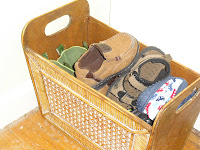Children inherit their traits from their parents, so the offspring of athletic parents is destined to be a sports phenom and the result of two Doctors is likely to love science, right? Not always. Though aptitude and ability do draw from genetics, encouragement and fostering do just as much for a child’s development. Here are 10 ways to help get your little learner to soak up as much knowledge as possible.
1. Teach them to read. The most important thing you can do for your children is to teach them how to read. Reading is the basis for all communication. The more they read the more they will know. Reading opens up the world to children. It is the easiest way to expand your vocabulary (and much more fun than sitting up with flash cards weeks before the SATs). Read to your children, with your children and let them read to you.
2. Expose them to art early. No one is saying to tote your screaming three year old to the opera; but the more frequent and earlier you go the less foreign art will seem later in life. Age appropriate events and explanations keep children from feeling overwhelmed and allow you to learn with them.
3. Praise their accomplishments. Let them know that they can get attention and accolades for being smart, too. Too often we honor athletic talent over academic, and wrongly so. Any positive interest a child shows should be nurtured. If you make a big deal about getting to the finals of the school spelling bee kids will feel good about being excellent spellers. Self confidence goes a long way. Remember: It’s hip to be a square.
4. Fake the enthusiasm. Don’t let your own hatred for math class trickle down to your children. If you continually rant on about how boring history class was, or how theater is for little old ladies, your kids are going to pick up on the sentiment. So try to spin your personal stories to portray school in a positive light and then pass your kids off to the teacher, who probably became a teacher because they actually liked school!
5. Get them a library card. And make them use it! You can learn any and everything in the library. Turn off the TV and video games and get moving to the public library. Library skills go a long way in life. You’re never going to know all the answers; the key is to know how to get the answers when you need them. Learning how to use the library and do research is a skill that will benefit your children in college and beyond. Books hold the information, whether you child wants to learn about space travel, life in the Wild West, Dinosaurs or weather patterns there’s a book at the library to help!
6. Encourage them to get involved. Whether it’s a book club or mathletes having a group of likeminded friends will help them to not feel like such an outsider. Structure also helps kids not go astray. Having a responsible adult who is well versed and enthusiastic about the same topic as your child, gives them something to strive towards and someone to keep them on track (with your help of course).
7. Teach them a second (or third) language. Even if it’s just basics, knowing how to have simple conversations or to read key words (like bathroom and airport) can go a long way. Just being exposed to the sounds of foreign languages helps kids learn. Speaking, reading, and writing other languages, exposes children to cultures outside of their own, making them more worldly and adaptable. It also opens up a new world of music, movies and literature!
8. Diversify. No one wants to be stuck doing times-tables or reading all day and night. Encourage your child to experience a wide-range of academic, cultural, and physical activities. Not everything needs to be a priority, but even the most dedicated scientist likes to get out of the lab once in awhile. Museums, concerts, music lessons, sports, play-dates, story-time, and the occasional hour in front of the television should all be apart of your child’s life. A wide range of experiences gives them a broad base of knowledge to build upon.
9. Sharing means Caring. The more you share with them the more they feel you care about what happens to them and in their lives. So share the artsy-nerdy things that you love with your child and encourage them to share with you. Remember you are your child’s first and most important teacher. If you show an interest in your child’s activities they are more likely to stick to them. Don’t dismiss them when they try to share what they learn with you. This is the best reinforcement you can give to learning.
10. Make it fun. Learning should be fun, not a chore or punishment. Telling children to “read a book” only after you’ve banned them from watching the television or going outside turns reading into a penalty; and once that association is made its hard to break. Reading for school becomes an unpleasant task. So make things fun. Create songs for times tables, spelling words, and new vocabulary. Turn story time into a game show. And make as much stuff hands-on as humanly possible. If learning is fun then it’s not hard to do.





